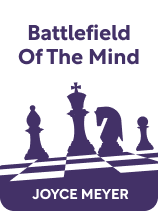

This article is an excerpt from the Shortform book guide to "Battlefield of the Mind" by Joyce Meyer. Shortform has the world's best summaries and analyses of books you should be reading.
Like this article? Sign up for a free trial here .
What discussion questions are raised by the book Battlefield of the Mind? What exercises can help you apply the book’s principles?
Being positive can be difficult. In Battlefield of the Mind, Joyce Meyer explains that the devil makes it his mission to corrupt our minds with negative thoughts. Luckily, we have God on our side. Meyer shows us how we can thwart Satan’s attacks and find happiness and fulfillment with God’s positivity as our guide.
Continue reading for our Battlefield of the Mind study guide.
Battlefield of the Mind Study Guide
This Battlefield of the Mind study guide can help you explore how your thoughts precede your actions, recognize negative thought patterns, take a thorough inventory of your thought processes, and identify a role model. These exercises can be done individually or with a group.
Exercise 1: Explore How Your Thoughts Precede Your Actions
Meyer explains that negative thoughts precede negative words and actions. Other people use those words and actions to form their opinions about us.
- Think about the last time you were disappointed with your choice of words and actions while interacting with another person. What did you say or do that you wish you hadn’t?
- Now think about the thoughts that preceded those words and actions. How would you characterize them?
- How do you think your thoughts impacted your interaction?
- How can you apply this insight to future interactions?
Exercise 2: Recognize Negative Thought Patterns
Meyer highlights six signs that our mind is under attack and not as positive as it should be. These signs are the manifestation of negative patterns of thinking. The more habitual these negative patterns become, the more they will negatively affect our words, actions, and ultimately our lives.
- Describe a negative pattern of thinking that has been appearing in your thought process recently.
- What impact has this negative pattern had on your words and actions?
- What can you say to yourself to break this pattern the next time you recognize it?
Exercise 3: Is Your Mind Lost?
If our mind is trapped in a negative mindset, we can feel lost in our own lives. Even if our circumstances are objectively pretty good, a negative mindset can make us feel miserable, frustrated, and hopeless. It might take a thorough inventory of our thought processes to realize that a negative mindset, rather than our circumstances, is causing our problems.
- Is there an area where you have felt “trapped” or “stuck” in your life?
- How have your circumstances impacted that feeling? (Has the feeling remained constant despite changing circumstances? Have you felt like the feeling would go away if your circumstances changed, only to find that it did not?)
- Can you identify any thought patterns that might be contributing to that feeling?
- What might be some different ways you can think about your situation? How might you change your thought patterns?
Exercise 4: Identifying a Role Model
Having a model of positivity to emulate can make our work towards a positive mind feel more tangible and attainable. Meyer chooses Jesus as a role model, but we might have someone else who has positive qualities that we would like to cultivate in ourselves.
- Think about someone whose positive qualities have made them a positive presence in your life recently. What qualities makes them a positive influence?
- Since we can’t see other people’s thoughts, what are some specific words and actions that this person said or did that had a positive impact on you?
- What qualities would you like to cultivate in your own life that would make you a more positive influence on others?
- What are some ways you can tweak your thought process to help you embody these qualities?

———End of Preview———
Like what you just read? Read the rest of the world's best book summary and analysis of Joyce Meyer's "Battlefield of the Mind" at Shortform .
Here's what you'll find in our full Battlefield of the Mind summary :
- How the Devil makes it his mission to corrupt our minds with negative thoughts
- How to recognize the signs that Satan is attacking your mind
- How to thwart Satan’s attacks and find happiness and fulfillment






